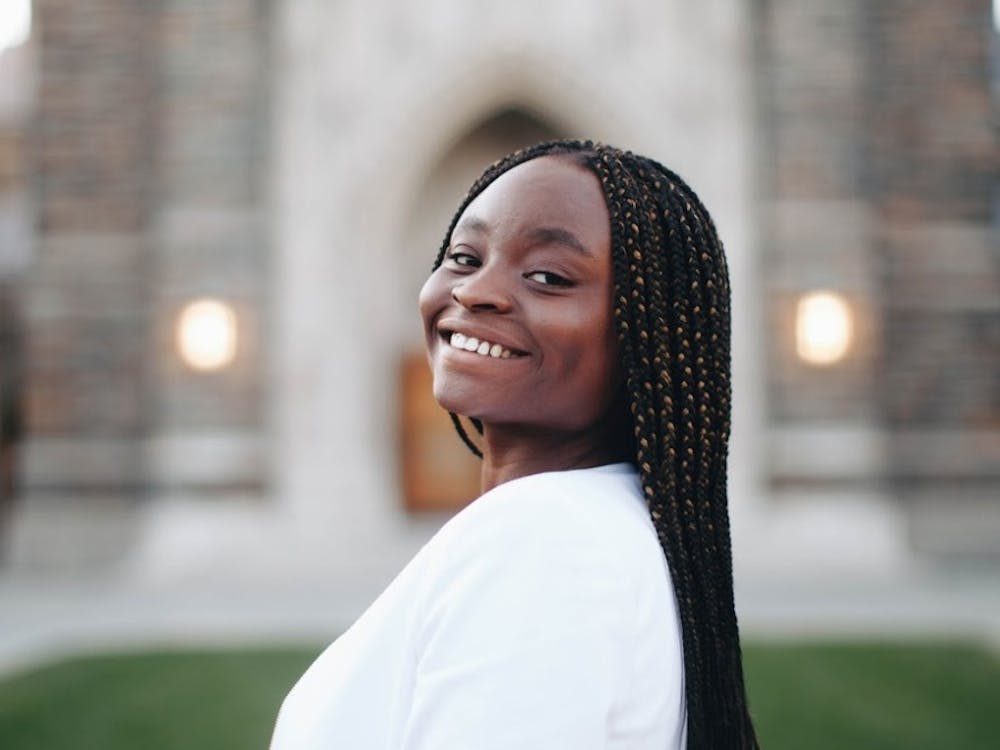Young Trustee finalist Maryam Asenuga, a senior, is committed to social justice and to building a more inclusive Duke.
An advocate for gender and racial justice, Asenuga worked with LBGTQ+ students and Blue Devils United to organize the University’s first pride invitational weekend for LGBTQ+ students and allies during last year’s Blue Devil Days. Her advocacy alongside Native and Indigenous students has also led to the opening of the first center for Indigenous and Native students on campus.
Asenuga’s dedication to social justice issues has been informed by her past. Her mother fled from Nigeria to New York a month before she was born. In Rhode Island, Asenuga’s mother raised her and her older sister completely on her own. Growing up, she watched her mother weather racism, sexism and xenophobia on a regular basis.
“She would always tell me that whatever challenge you face or whatever success you have, it has to be motivation to serve other communities and other people,” Asenuga said.
Her mother’s words have defined Asenuga’s experience not just on campus but also in the community.
Asenuga volunteers in Durham, providing mentorship for refugee children and their parents and helping them with schoolwork. In particular, she remembered tutoring 8-year-old Caroline and 10-year-old Angela from the Democratic Republic of the Congo. As an Arabic minor, Asenuga was able to easily communicate with the girls, developing a deep understanding of their traumatic experiences and current struggles as refugees in the United States.
Three days a week, before and after class, Asenuga serves hundreds of homeless Durham residents at a food kitchen operated by the Urban Ministries of Durham. Asenuga said that talking with Durham residents in need and understanding their lives has opened her eyes in many ways.
“Right outside Duke, there’s all this poverty,” she said. “Duke can definitely do better in its relationship with Durham.”
Asenuga noted that she strives to become a voice for people without one. The aspiring lawyer, who speaks four languages, has been around the globe. Having studied in Morocco, Chile, Nepal and Jordan during her four years at Duke, Asenuga finds her inspiration in traveling. Working with Indigenous communities abroad has led her to adopt a more critical lens when describing Duke’s relationship with indigenous and Native students.
“Not only is there a lack of acknowledgment, there’s a lack of support for Indigenous and Native students,” she said.
As director of racial and multicultural outreach for Duke Student Government, she helped to create an on-campus center dedicated to recognizing Duke's Native and Indigenous students. The center celebrates Native cultures and features artworks by Durham’s local Indigenous artists.
Moreover, Asenuga also works to make life easier for international students at Duke who, like her, come from an immigrant background.
“There’s a huge lack of institutional support for international students at Duke,” she said.
Asenuga has worked with career and visa services on several occasions and is actively seeking to improve the situation by figuring out ways to get more support for international students.
Although Asenuga has an “unwavering gratefulness” for Duke, she is certain the University can do better in terms of combating hate and bias incidents, accessibility for disabled students, handling sexual assault and improving Counseling and Psychological Services.
“The way that we handle these issues can really make or break Duke,” she said. “I have a perspective to not only address these issues but to also put in perspectives from other students on campus.”
She also recognized that, if elected, she would become the first black female undergraduate Young Trustee in Duke’s history.
“Although black students on campus are a small minority, we are a strong minority,” Asenuga said.
Tim Tyson, a senior research scholar at the Center for Documentary Studies, met Asenuga for the first time when interviewing her for the Duke Engage South Africa program.
“I was struck by her unassuming clarity, matter of fact intelligence and sly sense of humor,” he wrote in an email.
Asenuga interned at a gender justice nonprofit organization in South Africa during the summer after her sophomore year. She and other interns worked together on the case of a 12-year-old rape survivor. As the court continued to delay trial dates, she and her team organized a march to push the court to stop delaying dates and rule in favor of their client.
“Maryam's calm, dignified bearing and careful deployment of evidence persuaded a resistant South African judge to reconsider the case of a juvenile rape victim with whom the court had been callous,” Tyson wrote.
Senior Jake Hoberg, former executive vice president of DSG, stressed Asenuga’s unceasing efforts toward diversity and inclusion. Hoberg and Asenuga have been friends since orientation week and have served together in DSG.
He praised her ability to recognize Duke when it makes progress, but also criticize the University when it doesn’t measure up to its own standards.
“Her mother has instilled in her a sense of responsibility to fight to help others and that is what makes her so excited and passionate to run for the position,” Hoberg wrote in an email.
Editor's Note: This article has been updated to clarify that Asenuga worked with Blue Devils United and LGBTQ+ students on the pride invitational weekend, and alongside Native and Indigenous students on the center for Indigenous and Native students. The Chronicle regrets the error.
Get The Chronicle straight to your inbox
Signup for our weekly newsletter. Cancel at any time.

